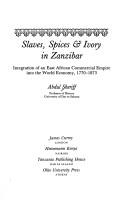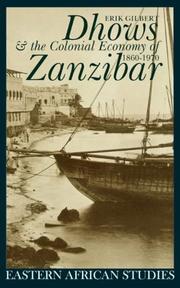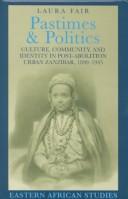| Listing 1 - 10 of 10 |
Sort by
|

ISBN: 0821440217 0585055912 9780585055916 9781782047773 9780821440216 0821408712 9780821408711 0821408720 9780821408728 0852550146 9780852550144 0852550154 9780852550151 1782047778 9781782049784 Year: 2016 Publisher: London, [England] : James Curry,
Abstract | Keywords | Export | Availability | Bookmark
 Loading...
Loading...Choose an application
- Reference Manager
- EndNote
- RefWorks (Direct export to RefWorks)
Slave trade --- Spice trade --- Ivory industry --- Business & Economics --- Economic History --- Wildlife products industry --- Spice industry --- Plant products industry --- History. --- Zanzibar --- Zanzibar Protectorate --- Zanzibar Executive --- Zanguebar --- Serikali ya Mapinduzi ya Zanzibar --- SMZ --- S.M.Z. --- Revolutionary Government of Zanzibar --- Serikali ya Mapinduzi Zanzibar --- Zanjibār --- Zanzibar (Tanzania) --- Zengibar --- Tanzania --- Commerce --- History
Book
ISBN: 1782049789 Year: 1987 Publisher: London : James Currey,
Abstract | Keywords | Export | Availability | Bookmark
 Loading...
Loading...Choose an application
- Reference Manager
- EndNote
- RefWorks (Direct export to RefWorks)
The rise of Zanzibar was based on two major economic transformations: firstly, slaves became used for the production of cloves and grain for export, instead of the slaves themselves being exported; secondly there was an increased demand for luxuries such as ivory and Zanzibar took advantage of its strategic position to trade as far as the Great Lakes. Yet this economic success increasingly subordinated Zanzibar to Britain, with its anti-slavery crusade and its control over the Indian merchant class.
North America: Ohio U Press; Kenya: EAEP
Slave trade --- Spice trade --- Ivory industry --- History. --- Zanzibar --- Commerce --- History --- Wildlife products industry --- Spice industry --- Plant products industry --- Zanzibar Protectorate --- Zanzibar Executive --- Zanguebar --- Serikali ya Mapinduzi ya Zanzibar --- SMZ --- S.M.Z. --- Revolutionary Government of Zanzibar --- Serikali ya Mapinduzi Zanzibar --- Zanjibār --- Zanzibar (Tanzania) --- Zengibar --- Tanzania --- Britain. --- East African Commercial Empire. --- Zanzibar. --- ivory trade. --- slavery. --- underdevelopment.
Book
ISBN: 0300052197 Year: 1992 Publisher: New Haven Yale university
Abstract | Keywords | Export | Availability | Bookmark
 Loading...
Loading...Choose an application
- Reference Manager
- EndNote
- RefWorks (Direct export to RefWorks)
#SBIB:39A73 --- Swahili-speaking peoples --- -Swahili-speaking peoples --- -Swahili (African people) --- Ethnology --- Etnografie: Afrika --- Commerce --- Kinship --- Social life and customs --- Lamu (Kenya) --- -Lamu (Kenya) --- -Zanzibar --- -Commerce --- Commerce. --- Kinship. --- Social life and customs. --- -Etnografie: Afrika --- Swahili (African people) --- Zanzibar --- Zanzibar Protectorate --- Zanzibar Executive --- Zanguebar --- Serikali ya Mapinduzi ya Zanzibar --- SMZ --- S.M.Z. --- Revolutionary Government of Zanzibar --- Serikali ya Mapinduzi Zanzibar --- Zanjibār --- Zanzibar (Tanzania) --- Zengibar --- Tanzania
Book
ISBN: 9781441984715 1441984704 9781441984708 1441984712 Year: 2015 Publisher: New York, NY : Springer New York : Imprint: Springer,
Abstract | Keywords | Export | Availability | Bookmark
 Loading...
Loading...Choose an application
- Reference Manager
- EndNote
- RefWorks (Direct export to RefWorks)
This study of nineteenth-century clove plantations on Zanzibar provides an important contribution to debates in global historical archaeology. Broadening plantation archaeology beyond the Atlantic World, this work addresses plantations run by Omani Arab colonial rulers of Zanzibar. Drawing on archaeological and historical data, this book argues for the need to examine non-Western contexts of colonialism and capitalism as coeval with those in the North Atlantic World. This work explores themes of capitalism, colonialism, plantation landscapes, African Diaspora communities, gender and sexuality, locally produced and imported goods in historic contexts, and Islamic historical archaeology.
Social Sciences. --- Archaeology. --- History. --- Social sciences. --- Sciences sociales --- Histoire --- Archéologie --- Plantation life --- Clove trade --- Slavery --- Capitalism --- Excavations (Archaeology) --- Archaeology and history --- History & Archaeology --- Archaeology --- History --- Plantation life. --- History, general. --- Country life --- Annals --- Auxiliary sciences of history --- Archeology --- Anthropology --- Antiquities --- 1800 - 1899 --- Oman --- Zanzibar --- Africa. --- Oman. --- Tanzania --- Colonies --- Economic conditions --- Social conditions --- Antiquities. --- Revolutionary Government of Zanzibar --- S.M.Z. --- Serikali ya Mapinduzi ya Zanzibar --- Serikali ya Mapinduzi Zanzibar --- SMZ --- Zanguebar --- Zanjibār --- Zanzibar Executive --- Zanzibar Protectorate --- Zengibar --- Mascate --- Muscat --- Muscat and Oman --- Salṭanat ʻUmān --- Sultanate of Oman --- ʻUmān (Sultanate) --- Eastern Hemisphere --- Zanzibar (Tanzania) --- عمان --- سلطنة عُمان --- オマーン --- オーマン

ISBN: 0852554869 0852554850 0821415573 0821415581 Year: 2004 Publisher: s.l. Ohio university press
Abstract | Keywords | Export | Availability | Bookmark
 Loading...
Loading...Choose an application
- Reference Manager
- EndNote
- RefWorks (Direct export to RefWorks)
Dhows --- Coastwise shipping --- Boutres --- Transports maritimes côtiers --- History --- Histoire --- Zanzibar --- Economic conditions --- Conditions économiques --- Transports maritimes côtiers --- Conditions économiques --- Shipping --- Lateens --- Boats and boating --- Sailing ships --- Marine shipping --- Marine transportation --- Maritime shipping --- Ocean --- Ocean traffic --- Ocean transportation --- Sea transportation --- Shipping industry --- Water transportation --- Communication and traffic --- Marine service --- Transportation --- Merchant marine --- Economic aspects --- Indian Ocean Region --- Indian Ocean Rim countries --- Zanzibar Protectorate --- Zanzibar Executive --- Zanguebar --- Serikali ya Mapinduzi ya Zanzibar --- SMZ --- S.M.Z. --- Revolutionary Government of Zanzibar --- Serikali ya Mapinduzi Zanzibar --- Zanjibār --- Zanzibar (Tanzania) --- Zengibar --- Tanzania --- Commerce --- History. --- Economic conditions. --- Foreign relations.

ISBN: 082141383X 9780821413838 0821413848 9780821413845 0852557957 9780852557952 0852557965 9780852557969 Year: 2001 Publisher: Athens Oxford [England] Ohio University Press J. Currey
Abstract | Keywords | Export | Availability | Bookmark
 Loading...
Loading...Choose an application
- Reference Manager
- EndNote
- RefWorks (Direct export to RefWorks)
"The first decades of the twentieth century were years of dramatic change in Zanzibar, a time when the social, economic, and political lives of island residents were in an incredible flux framed by the abolition of slavery, the introduction of colonialism, and a tide of urban migration. Pastimes and Politics explores the era from the perspective of the urban poor, highlighting the numerous and varied ways that recently freed slaves and other immigrants to town struggled to improve their individual and collective lives and to create a sense of community in the new environment. In this study Laura Fair explores a range of cultural and social practices that gave expression to slaves' ideas of emancipation, and describes how such ideas and practices were gendered."--Jacket.
Popular culture --- Identity (Psychology) --- Group identity --- Leisure --- Ethnicity --- Ethnic identity --- Cultural fusion --- Multiculturalism --- Cultural pluralism --- Free time (Leisure) --- Leisure time --- Recreation --- Collective identity --- Community identity --- Cultural identity --- Social identity --- Social psychology --- Collective memory --- Personal identity --- Personality --- Self --- Ego (Psychology) --- Individuality --- Culture, Popular --- Mass culture --- Pop culture --- Popular arts --- Communication --- Intellectual life --- Mass society --- Zanzibar --- Social life and customs --- #SBIB:39A73 --- #SBIB:96G --- Etnografie: Afrika --- Geschiedenis van Afrika. --- Zanzibar Protectorate --- Zanzibar Executive --- Zanguebar --- Serikali ya Mapinduzi ya Zanzibar --- SMZ --- S.M.Z. --- Revolutionary Government of Zanzibar --- Serikali ya Mapinduzi Zanzibar --- Zanjibār --- Zanzibar (Tanzania) --- Zengibar --- Culture --- Geschiedenis van Afrika --- Tanzania
Book
ISBN: 2869787308 9782869787308 9782869786806 2869786808 Year: 2016 Publisher: Dakar CODESRIA
Abstract | Keywords | Export | Availability | Bookmark
 Loading...
Loading...Choose an application
- Reference Manager
- EndNote
- RefWorks (Direct export to RefWorks)
Slavery --- Abolition of slavery --- Antislavery --- Enslavement --- Mui tsai --- Ownership of slaves --- Servitude --- Slave keeping --- Slave system --- Slaveholding --- Thralldom --- Crimes against humanity --- Serfdom --- Slaveholders --- Slaves --- History. --- Mauritius. --- Tanzania --- Revolutionary Government of Zanzibar --- S.M.Z. --- Serikali ya Mapinduzi ya Zanzibar --- Serikali ya Mapinduzi Zanzibar --- SMZ --- Zanguebar --- Zanjibār --- Zanzibar Executive --- Zanzibar Protectorate --- Zengibar --- Drontens --- Estado de Mauricio --- Île Maurice --- Mārīśasa --- Maurice --- Mauricio --- Mauritious --- Maʼuritsyus --- Mavriki --- Môriśasa --- Mōrishasu --- Repiblik Moris --- Republic of Mauritius --- République de Maurice --- Enslaved persons
Book
ISBN: 9780253024497 9780253024565 9780253024619 0253024617 0253024498 0253024560 Year: 2017 Publisher: Bloomington and Indianapolis
Abstract | Keywords | Export | Availability | Bookmark
 Loading...
Loading...Choose an application
- Reference Manager
- EndNote
- RefWorks (Direct export to RefWorks)
By situating Popobawa discourse within the social and cultural world of the Swahili Coast as well as the wider world of global popular culture, Thompson demonstrates that uses of this legend are more diverse and complex than previously thought and provides insight into how women and men communicate in a place where taboo, prohibition, and restraint remain powerful cultural forces.
Sex customs --- Tanzanians --- Animals, Mythical --- Demonology --- Public opinion --- Swahili language --- Attitudes. --- Sexual behavior --- Discourse analysis. --- Zanzibar --- Social life and customs. --- Opinion, Public --- Perception, Public --- Popular opinion --- Public perception --- Public perceptions --- Judgment --- Social psychology --- Attitude (Psychology) --- Focus groups --- Reputation --- Demonology, Christian --- Demons --- Evil spirits --- Spirits --- Spiritual warfare --- Creatures, Fabled --- Fabled creatures --- Fabulous animals --- Fabulous creatures --- Fantastic animals --- Fictitious animals --- Imaginary animals --- Legendary animals --- Mythical animals --- Zoological mythology --- Animals --- Dragons --- Ethnology --- Customs, Sex --- Human beings --- Sexual practices --- Manners and customs --- Moral conditions --- Sex --- Kiswahili language --- Suaheli language --- Bantu languages --- Mythology --- Zanzibar Protectorate --- Zanzibar Executive --- Zanguebar --- Serikali ya Mapinduzi ya Zanzibar --- SMZ --- S.M.Z. --- Revolutionary Government of Zanzibar --- Serikali ya Mapinduzi Zanzibar --- Zanjibār --- Zanzibar (Tanzania) --- Zengibar --- Tanzania --- Attitudes --- Discourse analysis --- Social life and customs --- Sex customs - Tanzania - Zanzibar - Attitudes --- Tanzanians - Sexual behavior - Attitudes --- Animals, Mythical - Tanzania - Zanzibar --- Demonology - Tanzania - Zanzibar --- Public opinion - Tanzania - Zanzibar --- Swahili language - Discourse analysis --- Zanzibar - Social life and customs
Book
ISBN: 9781911487050 Year: 2017 Publisher: Surbiton, Surrey Medina Publishing
Abstract | Keywords | Export | Availability | Bookmark
 Loading...
Loading...Choose an application
- Reference Manager
- EndNote
- RefWorks (Direct export to RefWorks)
Tippu Tip, notorious to some, intriguing to others, was a Zanzibari Arab trader living in the turbulent and rapidly changing Africa of the late 19th century. This biography transports the reader into his extraordinary world, describing its exotic cast of characters and the principal factors that shaped it. His colorful life culminated in his engagement as governor of a province in the 'Congo Free State' of the Belgian King Leopold, and in his involvement in Stanley's astonishing expedition to relieve Emin Pasha, governor of the Egyptian southern province of Equatoria. This book is the first thorough investigation in English of this significant figure. The lucid narrative unfolds against the political and economic backdrop of European and American commercial aims, while allowing the reader to see the period through African and Arab eyes. The fascinating figures who strutted the 19th-century African stage, and their hardly believable exploits, give this book an appeal reaching beyond the African specialist to the general reader.
Merchants --- Plantation owners --- Slaveholders --- Slave traders --- Tippu Tip, --- Congo (Democratic Republic) --- Zanzibar --- History --- Slave dealers --- Slavers --- Traders, Slave --- Persons --- Slave holders --- Slave masters --- Slave owners --- Slavemasters --- Slaveowners --- Slavery --- Owners of plantations --- Planters (Persons) --- Landowners --- Businesspeople --- Ḥamad ibn Muḥammad, --- Hamed bin Mohammed, --- Hamed bin Muhammed el Murjebi, --- Hamid bin Muḥammad bin Jumʻah bin Rajab bin Muḥammad bin Saʻīd al-Murjabi, --- Ḥāmid ibn Muḥammad, --- Hamid, Muhammed bin, --- Hemed bin Muhammad el Murjebi, --- Mohammed, Hamed bin, --- Muḥammad, Ḥāmid ibn, --- Muhammed bin Hamid, --- Murjabi, Hamid bin Muḥammad bin Jumʻah bin Rajab bin Muḥammad bin Saʻīd, --- Murjebi, Hamed bin Muhammed el, --- Murjībī, Ḥamad ibn Muḥammad, --- Tīb, Tībū, --- Tib, Tippoo, --- Tib, Tippu, --- Tībū Tīb, --- Tip, Tippo, --- Tip, Tippu, --- Tippo Tip, --- Tippoo Tib, --- Tippu Tib, --- Tipu Tipu, --- حمد بن محمد بن جمعة بن رجب بن محمد بن سعيد المرجبي, --- Zanzibar Protectorate --- Zanzibar Executive --- Zanguebar --- Serikali ya Mapinduzi ya Zanzibar --- SMZ --- S.M.Z. --- Revolutionary Government of Zanzibar --- Serikali ya Mapinduzi Zanzibar --- Zanjibār --- Zanzibar (Tanzania) --- Zengibar --- Tanzania --- Congo (Kinshasa) --- Congo (Leopoldville) --- Congo DR --- Democratic Republic of Congo --- Democratic Republic of the Congo --- Demokraticheskai︠a︡ Respublika Kongo --- DR Congo --- DRC (Democratic Republic of the Congo) --- DRK (Demokraticheskai︠a︡ Respublika Kongo) --- Kongo --- RD Congo --- R.D. Congo --- RDC (République démocratique du Congo) --- Republic of Congo (Leopoldville) --- Republic of the Congo (Leopoldville) --- République démocratique du Congo --- République du Congo (Leopoldville) --- Belgian Congo --- Zaire --- Commerce --- Enslavers --- Tippu Tip
Book
ISBN: 9781137593900 1137593903 113759389X Year: 2017 Publisher: Palgrave Macmillan UK
Abstract | Keywords | Export | Availability | Bookmark
 Loading...
Loading...Choose an application
- Reference Manager
- EndNote
- RefWorks (Direct export to RefWorks)
In this book, Tale Steen-Johnsen explains how religious peacebuilders are limited by both formal and more subtle political strategies aimed at regulating civil society. Political authorities have a vested interest in keeping social and religious movements under control, which limits the opportunities religious leaders have to diminish violent conflicts between religious groups. This volume offers empirical examples of these connections in Ethiopia, Kenya, Zanzibar and Tanzania. It is valuable resource for both scholars and development practitioners interested in how politics and religion become conflated when religious actors engage to build peace. .
Polemology
---
vrede
---
Peace.
---
Peace Studies.
---
Coexistence, Peaceful
---
Peaceful coexistence
---
International relations
---
Disarmament
---
Peace-building
---
Security, International
---
Äthiopien
---
Kenia
---
Sansibar
---
Tansania
---
Afrika
---
Afrikaner
---
Zansibar
---
Unguja Island
---
Zanzibar
---
Zanguebar
---
Insel
---
Ǧumhūrīyat Tanzānīya
---
Jamhuri ya Tanzania
---
Jamhuri ya Muungano wa Tanzania
---
United Republic of Tanganyika and Zanzibar
---
Tanganyika and Zanzibar
---
Vereinigte Republik Tansania
---
Tanzanija
---
Tanzania
---
United Republic of Tanzania
---
Tanganyika
---
26.04.1964
---
-ʾItyop̣p̣ĕyā
---
Ityop̣p̣eyā
---
Ityop'ya
---
Demokratische Bundesrepublik Äthiopien
---
Abessinien
---
<
| Listing 1 - 10 of 10 |
Sort by
|

 Search
Search Feedback
Feedback About UniCat
About UniCat  Help
Help News
News